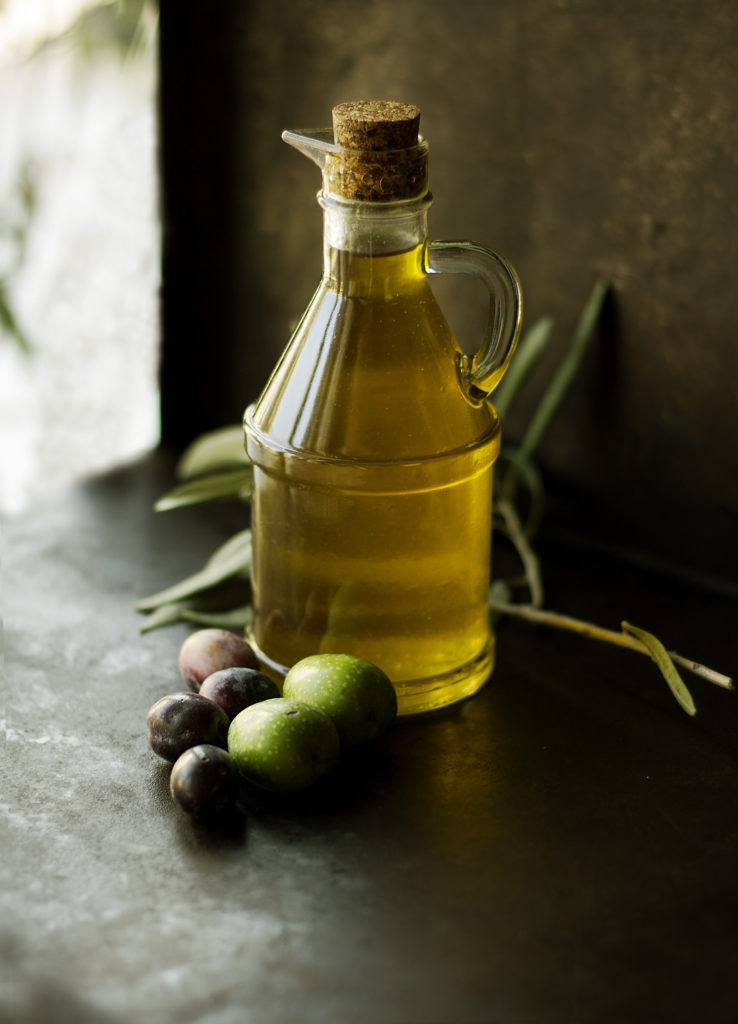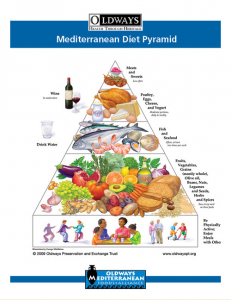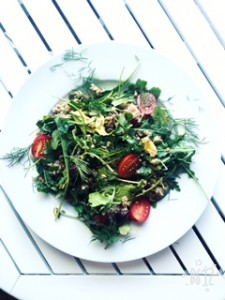Ok, I know, we’re technically in February, which means our discussions on trendy diets, which was the focus for the month of January, should be finished. But it’s just the first day, and this one is so good we had to include it. We absolutely had to include a discussion on the Mediterranean diet, and I’m going to do my best to use it to segue into our next set of posts that will be the focus for the month of February: FATS!
What is the Mediterranean Diet?
The Mediterranean diet was started as a heart healthy eating plan, and now has also been seen to be associated with lowering cholesterol levels, as well as lowering the risk of cancer, Parkinson’s and Alzheimer’s diseases. The Mediterranean diet plan focuses on eating plant-based foods, specifically a high content of fruits and vegetables, as well as whole grains, legumes, and nuts. Although this diet stresses to consume most protein from plant sources, fish and poultry are consumed at least twice a week, and red meat is limited in consumption to a few times a month. Another key component of the diet is to remove salt and instead season with fresh herbs and spices, and to remove butter and replace with healthy oils, such as olive oil or avocado oil.
Scientifically Proven Benefits of the Mediterranean Diet
As mentioned above, there are many proven health benefits of the Mediterranean diet that have been extensively studied by numerous prestigious scientific journals. The studies all seem to report the vast benefits provided by this eating plan.
The Mediterranean diet has been proven to be very beneficial for heart health.
- A 2013 study published in the New England Journal of Medicine concluded that the diet plan reduced occurrence of major cardiovascular events.
- This finding was corroborated by the American Journal of Medicine, who reported in 2015 that the Mediterranean diet reduced the risk for heart disease by lowering blood pressure, glucose levels, BMI, and other health indicators.
The Mediterranean diet has also been proved to be beneficial for brain health.
- In 2013, the journal Epidemiology published findings that adherence to the Mediterranean diet was associated with better brain function, lower risk of brain function decline, and a lowered risk of developing Alzheimer’s disease.
- This was also found to be true in a 2017 study published by the American Geriatrics Society which links the Mediterranean diet to a lower risk for memory problems in aging persons.
Blue Zone Accreditation Reaffirm Success of Mediterranean Diet
Have you heard of the 5 “Blue Zones” throughout the world? These are places that have been studied by the National Geographic Society and have been found to hold the secret to long and healthy life. The Blue Zones boast high concentration of individuals who have lived past 100 years old, and who have done so with low rates of heart disease, obesity, cancer, and diabetes. These places include:
- Ikaria, Greece
- Okinawa, Japan
- the Ogliastra Region of Sardinia
- Loma Linda, California
- the Nicoya Peninsula of Costa Rica
Although these areas are very different geographically, they all have several things in common. Much of these cultures successes can be traced to their diet choices, which focus on eating mostly plant foods and getting most protein from plant sources. The inclusion of Ikaria, Greece on this prestigious list is attributed to their adoption of the Mediterranean diet and the health benefits that this provides. The focus on plant-based protein, healthy fats from olive oil and fish sources, and low consumption of red meat is similar to the diets of the other 4 Blue Zones, and has been found to lead to a long, healthy lifespan.
Healthy Fats in the Mediterranean Diet
There is a reason that the fat sources included in the Mediterranean diet are so beneficial and essential. The benefits that these fats provide are not just in the fact that they are less unhealthy fat, but actually quite the opposite. These fats are absolutely healthy fat source that is beneficial to include in our diets. For further information on why this particular source of fats is essential to our diets, check out our previous post on understanding fat.
The Mediterranean diet provides great source of monounsaturated fats from olive oil, avocado oil, hummus, and pine nuts. It is also important to point out that the Mediterranean diet provides the two kinds of polyunsaturated fats are not produced within the human body, and are therefore essential to receive from the diet: omega 6 fats and omega 3 fats. Omega 6 rich foods include eggs, seeds, and meats, which are consumed in moderate amounts in the Mediterranean diet. The Mediterranean diet’s focus on fish provides a great source of the essential omega 3 fats.
Easy Steps to Adopt the Mediterranean Diet
Sounds pretty great, doesn’t it? Are you looking for easy ways to see some of these benefits in your diet plan? Try these suggestions:
- Reduce consumption of red meat. Even if you are not ready to eliminate it completely, start with cutting back to just once a week.
- Eat more seafood. As mentioned above, the healthy fats and lean protein provided by fish has immense health benefits. Try to eat seafood once per week. If you are not comfortable cooking fish, make that be your “go-to” order when eating out at a restaurant.
- Use more healthy oils, specifically olive oil or avocado oil. We discussed the benefits of these healthy fats above. Instead of using butter in your cooking, make the easy swap to either of these healthier choices.
- Use fresh herbs for seasoning, instead of salt. The flavor of your food will be so fresh, bold, and unique, that you won’t miss the salt, but will get immense health benefits by removing it.
- Find ways to eat more fruits and vegetables. An easy switch that would have a profound effect would be to swap fresh fruits and/ or veggies as snacks throughout the day, instead of choosing processed or packaged snacks that might be a more typical choice.
Check out this modified food pyramid based on the Mediterranean diet to help visualize the recommended intakes.
Wrapping Up The Discussion on Trendy Diets
This week we have delved into the background and health benefits of the Mediterranean diet, and it sounds pretty appealing. This may be confusing, however, considering the past few weeks we have also discussed the health benefits of a vegan diet, the keto diet, the Whole 30 diet, and the DASH diet. All of these diet plans claim to be associated with increasing health and decreasing risk of disease, but yet they are all very different. How can we choose which plan is right for us? This may seem overwhelming, and it may take some time to test out which plan is right for you. Although we have tried to provide as much information as possible to help you make this choice, if you would like more personalized guidance and assistance in adopting a diet and healthy lifestyle that fits your life, please reach out and we would love to help you. And please update us in the comments as to what plan works for you. We love to get feedback on what is working so we can plan future discussions!
Weekly Meal Plan
This week we had the pleasure of collaborating with Adele Pile from the Headache Free Foodie blog to create a great meal plan that embraces all the benefits of the Mediterranean diet!
Day 1: When limiting intake of red meat, a stunning dish like this Lamb Shoulder is a great option for when you do choose to eat it. Serve with these Green Beans with Tomatoes.
Day 2: After a heavier meal yesterday, enjoy a bright and flavorful, yet deliciously light Mediterranean Avocado Salad.
Day 3: Enjoy this delicious Walnut Encrusted Salmon. Serve with Beans and Greens and Cous Cous and Lentil Salad for a healthy, hearty meal.
Day 4: This Chickpea and Bean Stew is a wonderful embodiment of the principles of the Mediterranean diet.
Day 5: After so many delicious recipes this week, there is likely to be so many leftovers. Whip up this Favas Santorini to enhance and repurpose the rest of the weeks recipes. Use as a spread on crusty, whole grain bread to make a delicious sandwich with the leftover lamb or salmon, or have it with whole grain crackers or cut up vegetables to round out a meal with the remaining vegetable dishes from the week.
Grocery List








